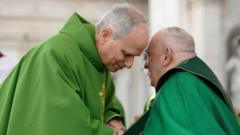Following a swift conclave that indicated a consensus among voting cardinals, Cardinal Robert Prevost has been elected as the new pope, taking on the challenges of leadership at a critical time. The recurring themes during the selection process were "continuity" and "unity," reflecting a desire to maintain and build upon the impactful outreach initiated by Pope Francis.
Cardinal Prevost gained respect within the Church for his ability to connect with diverse factions, navigating the often-divided perspectives of progressive and traditionalist forces. His election signals not only a commitment to uphold Pope Francis's message to the marginalized but also a conscious effort to bridge internal divides within the clergy.
In light of ongoing global issues—such as conflict, migration, and climate change—the cardinals sought a leader who could effectively communicate and resonate with various demographics. Prevost, a dual citizen of the United States and Peru, exemplifies that connection, making him a fitting choice to engage with both North American and Latin American audiences.
In his inaugural address from St. Peter's balcony, now known as Pope Leo XIV, he echoed calls for "building bridges" among nations and emphasized the idea of humanity as "one people." These foundational ideas align strongly with the prior papacy's focus, suggesting a continuity of message.
As he steps into this pivotal role, Prevost faces scrutiny over his political views and record on pressing social issues, with many hopeful that his leadership will steer the Church toward addressing both its internal challenges and the needs of the broader world. With a decisive conclave outcome, he commences his papacy with the backing of those he must rely upon most to navigate the path forward for the Church.
Cardinal Prevost gained respect within the Church for his ability to connect with diverse factions, navigating the often-divided perspectives of progressive and traditionalist forces. His election signals not only a commitment to uphold Pope Francis's message to the marginalized but also a conscious effort to bridge internal divides within the clergy.
In light of ongoing global issues—such as conflict, migration, and climate change—the cardinals sought a leader who could effectively communicate and resonate with various demographics. Prevost, a dual citizen of the United States and Peru, exemplifies that connection, making him a fitting choice to engage with both North American and Latin American audiences.
In his inaugural address from St. Peter's balcony, now known as Pope Leo XIV, he echoed calls for "building bridges" among nations and emphasized the idea of humanity as "one people." These foundational ideas align strongly with the prior papacy's focus, suggesting a continuity of message.
As he steps into this pivotal role, Prevost faces scrutiny over his political views and record on pressing social issues, with many hopeful that his leadership will steer the Church toward addressing both its internal challenges and the needs of the broader world. With a decisive conclave outcome, he commences his papacy with the backing of those he must rely upon most to navigate the path forward for the Church.




















